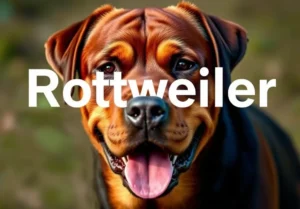Building a strong relationship with your Rottweiler is essential to fostering trust and companionship. Positive reinforcement techniques not only enhance your dog’s training but also deepen the bond you share.
The best way to strengthen your connection with your Rottweiler is through consistent use of positive reinforcement, rewarding good behavior with treats, praise, or play. There’s a world of techniques and insights waiting for you that can take your partnership to new heights, so let’s uncover those as you scroll down!

What is Positive Reinforcement?
Positive reinforcement is a powerful training technique that’s all about encouraging good behavior by rewarding it.
Rather than relying on punishment to discourage unwanted actions, this approach focuses on reinforcing desirable behaviors with treats, praise, or playtime.
This method is significant in dog training because it builds trust and strengthens the bond between you and your Rottweiler. By consistently rewarding your pup for good behavior—like sitting, staying, or coming when called—you encourage them to repeat those actions. Over time, they’ll associate following commands with positive experiences, making training more effective and enjoyable for both of you. It’s a win-win, promoting a happy, well-adjusted dog that feels secure in their environment.
Why Rottweilers Respond Best to Positive Reinforcement
Rottweilers are known for their intelligence and eagerness to please, which makes them particularly responsive to positive reinforcement.
These dogs thrive on attention and affection, so when you reward them for good behavior, they’re not just motivated by treats but also by your praise and connection.
Moreover, Rottweilers have a natural instinct to protect their families. When trained with positivity, they become more confident and relaxed, leading to a strong, trusting relationship. Here’s a bit more about why this training style clicks with Rottweilers:
- Motivation: They love it when you’re happy with them; it fuels their desire to perform well.
- Temperament: Rottweilers can be sensitive. Positive reinforcement helps mitigate stress and fosters a calm learning environment.
- Socialization: This breed benefits from interactions. Positive experiences encourage them to engage with other dogs and people, enhancing their social skills.
Using positive reinforcement allows you to tap into these traits efficiently, promoting not just obedience but overall well-being. Plus, who doesn’t love seeing their Rottie’s tail wag with excitement when they’ve done something right?
How to Get Started with Positive Reinforcement
Positive reinforcement is a game-changer for building a solid bond with your Rottweiler. Begin by focusing on timing; rewards should be given immediately after your dog displays the desired behavior. This connection between action and reward helps your Rottweiler grasp what they did right.
To kick things off, choose a variety of rewards. These can include tasty treats, praise, or even a favorite toy. Mixing it up keeps the learning process exciting. Start with simple commands like “sit” or “stay.” When your pup responds correctly, shower them with praise and the chosen reward.
Next, Keep your training sessions short and fun—about 5 to 10 minutes a few times a day works wonders.
Dogs typically have attention spans that can diminish quickly. A study on animal behavior suggests that shorter training sessions help maintain engagement and focus. By training for 5 to 10 minutes, you maximize the likelihood of your dog remaining attentive, making it easier for them to absorb commands.
Your Rottweiler’s attention span can wane, so it’s crucial to keep it engaging. If they lose interest, feel free to break it up and return later.
Lastly, maintain a positive attitude. Dogs can sense your emotions, so staying calm and upbeat will bolster their enthusiasm. Celebrate small victories together, and watch your bond grow stronger!
Common Mistakes to Avoid
Training with positive reinforcement is generally straightforward, but there are a few common pitfalls that can trip you up. One key mistake is inconsistent rewards.
If you don’t consistently reward your Rottweiler for desired behaviors, they might get confused about what’s expected. Stick to a routine so your dog knows what to look forward to.
Another frequent issue is rewarding unwanted behaviors. For instance, if your Rottweiler jumps up on you when you get home, giving them attention—even if it’s just to say “no”—can reinforce that behavior. Ignore the jumping and only reward them once all four paws are on the ground.
Be mindful of your tone and body language. If you’re using a harsh tone or displaying frustration, your Rottweiler might become anxious rather than enthusiastic. Aim for an encouraging tone and open body posture.
Also, keep an eye out for delayed rewards. If you’re too slow to reward your dog after a good behavior, they may not associate the prize with their action. Timeliness is crucial; always reward right after the behavior occurs.
Lastly, don’t overwhelm your Rottweiler with too many commands at once. Focus on one or two behaviors at a time, reinforcing those before moving on. Patience pays off, and clarity will make a world of difference in your training journey.
How to Use Treats Effectively
Choosing the right treats for your Rottweiler is crucial in building a strong bond. Go for high-value treats that your dog really loves, like small pieces of cooked chicken or commercial options designed for training. Remember, size matters; use tiny morsels to keep the training session fast-paced and rewarding.
In practice, employ treats as a positive reinforcement tool. For example, when your Rottweiler nails a command like “sit,” immediately reward them. Timing is everything; give the treat just as they perform the desired action. This creates a clear connection between the behavior and the reward.
As you progress, begin to reduce the frequency of treats without losing the positive impact. Switching to verbal praise or affection can still reinforce good behavior, allowing you to eventually phase out treats entirely for specific commands. However, keep some treats handy for high-energy training sessions or new skills.
Another effective tip is to rotate treats regularly to keep your pup engaged. Just like we enjoy variety in our meals, your Rottweiler will appreciate different flavors and textures, which can enhance their excitement during training.
The Role of Play in Bonding
Incorporating play into your training sessions isn’t just fun; it’s a potent way to enhance your bond with your Rottweiler. Dogs are naturally playful, and combining learning with play taps into their instincts while making training feel less like work and more like a shared experience.
Interactive games that require problem-solving—like hiding treats around the house or engaging in fetch—can strengthen your connection. These activities allow your Rottweiler to use their natural instincts to hunt or retrieve, cementing the idea that learning is rewarding and exciting.
Don’t overlook the importance of cooperative play. Activities like agility training or obstacle courses can foster trust as you guide your Rottweiler through new challenges together. The closer you work together, the stronger your bond becomes.
Remember, it’s not just about physical exercise; mental stimulation is equally important. Use puzzles or toys that require them to think, giving your Rottweiler a sense of accomplishment when they succeed. This combination of physical and mental challenges cultivates a deeper relationship, as your dog learns to rely on you as a guide and playmate.
By merging positive reinforcement training with enjoyable play, you’re not only teaching your Rottweiler; you’re also building a lifelong friendship.
Creative Ways to Reinforce Training
Training a Rottweiler can be a rewarding experience when you tap into their playful nature. Turning training sessions into fun activities keeps your dog engaged and eager to learn. Here are some dynamic ideas to get you started:
-
Fetch with a Twist : Instead of just tossing a ball, call out basic commands before each throw, like “sit” or “down.” With every completed command, toss the ball a little further. This encourages both physical and mental stimulation.
-
Treasure Hunts : Hide treats around your home or yard and let your Rottweiler sniff them out. This stimulates their hunting instincts and reinforces the idea that good behavior, like finding the treasure, pays off.
-
Obstacle Course : Set up a DIY obstacle course using household items. Teach your Rottweiler to jump over broomsticks or weave between chairs, rewarding them each time they complete a course.
-
Interactive Toys : Invest in puzzle toys that dispense treats as your dog solves them. This not only keeps them busy but reinforces the behavior of problem-solving.
-
Dance Party : Get moving! Teach your dog to dance by rewarding them for standing up on their hind legs or spinning in circles. It’s a joyful way to bond and reinforces positive movement.
These activities foster a stronger connection while making training a joyful experience.
The Science Behind Positive Reinforcement
Recent studies show that positive reinforcement isn’t just about rewards—it shapes your Rottweiler’s emotional well-being and behavior.
Research indicates that dogs trained using positive methods exhibit less stress and anxiety compared to those subjected to punitive techniques. A study published in the journal Applied Animal Behavior Science found that dogs trained with rewards showed enhanced learning ability, leading to faster mastery of commands.
Furthermore, a 2017 study published in Applied Animal Behavior Science highlighted that dogs trained with positive reinforcement displayed improved recall and responsiveness, reinforcing the preference for reward-based training methods in fostering effective communication and learning in dogs.
When you consistently reward your Rottweiler for desirable behaviors, you’re building their self-esteem. Positive feelings lead to a strong bond between you and your dog, making them more likely to repeat the behaviors you want to encourage.
Additionally, using treats or praise in moments of good behavior helps establish trust. A study highlighted in Frontiers in Psychology suggests that dogs trained with positive reinforcement are often more resilient in stressful situations.
When your Rottweiler feels secure and loved, they’re more likely to be responsive and engaged during training sessions, resulting in effective communication.
Focusing on positive reinforcement not only fine-tunes your Rottweiler’s skills but also cultivates a happier, well-adjusted companion.
Alex, a passionate animal lover, has experience in training and understanding animal behavior. As a proud pet parent to two dogs and three cats, he founded AnimalReport.net to share insights from animal experts and expand his knowledge of the animal kingdom.




